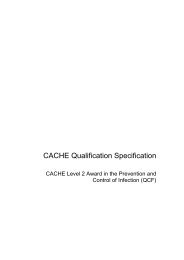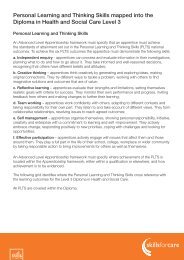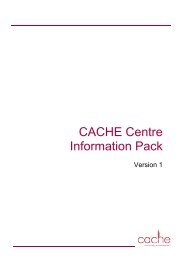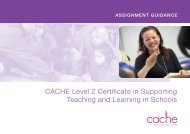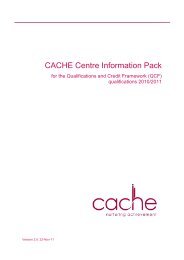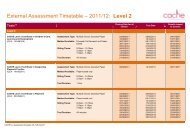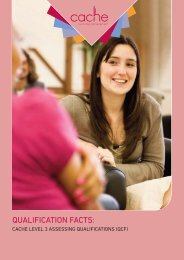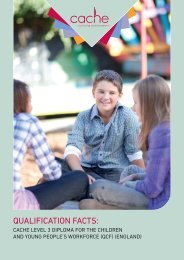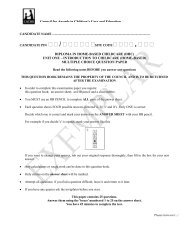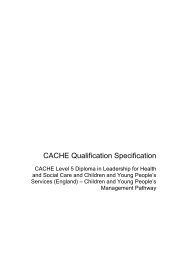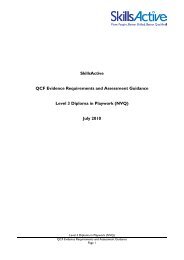Centre Guide - Cache
Centre Guide - Cache
Centre Guide - Cache
You also want an ePaper? Increase the reach of your titles
YUMPU automatically turns print PDFs into web optimized ePapers that Google loves.
YOUR GUIDE TO BEING<br />
A CACHE CENTRE<br />
Children & Young People<br />
Education Support<br />
Health and Social Care<br />
Health<br />
Playwork<br />
Quality of Assessment
Your <strong>Guide</strong> to Being a CACHE <strong>Centre</strong><br />
Contents<br />
01 Welcome 01<br />
02 Becoming a CACHE <strong>Centre</strong><br />
Online services 02<br />
Personalised support 03<br />
Subject Specialist support 03<br />
Training days, information days and<br />
bespoke activities 03<br />
Qualifications development 03<br />
Improving our services 03<br />
From Approval to <strong>Centre</strong> Quality Audit 03<br />
Registering learners 03<br />
Assessors, internal moderators and<br />
quality assurers 03<br />
Requesting extra support and reasonable<br />
adjustments for learners 03<br />
Retaining copies of learners’ work 04<br />
Administering external assessment 04<br />
Learners' results 04<br />
Queries 05<br />
Certificates and Direct Certificate<br />
Claims Status 05<br />
Maintaining the quality and integrity of<br />
your qualifications 05<br />
Records for <strong>Centre</strong> Quality Audit 06-07<br />
Identifying risk and extra support 08<br />
Identified Malpractice and<br />
Maladministration 08<br />
04 Types of assessment<br />
Multiple choice questions 10<br />
Practical Assessments 10<br />
Assignments 10<br />
Portfolio of Evidence 10<br />
External Assessment 10<br />
UCAS Points 10<br />
05 Preparation, Implementation of<br />
Assessment, Moderation and<br />
Quality Assurance<br />
Planning for internally assessed assignments 11<br />
Marking internally assessed assignments 11<br />
Moderating internally assessed assignments 11<br />
Flow Chart for NQF Internal Moderation 12-13<br />
Assessing Portfolio Evidence 14<br />
Flow Chart for Holistic Assessment<br />
of QCF Portfolio Evidence 14-15<br />
Internally Quality Assuring Portfolio Evidence 16<br />
Flow Chart for Holistic Internally Quality<br />
Assuring QCF Portfolio Evidence 16-17<br />
06 Terms you will encounter<br />
Credit transfer 18<br />
Personal Learning Record (PLR) 18<br />
Rules of Combination (RoC) 18<br />
Recognition of Prior Learning (RPL) 18<br />
Value statements 19<br />
03 About the qualifications<br />
Qualification Frameworks 09<br />
National Qualifications Framework 09<br />
Qualifications and Credit Framework 09
Your <strong>Guide</strong> to Being a CACHE <strong>Centre</strong><br />
01: Welcome<br />
Welcome to the Council for Awards in Care, Health and Education (CACHE) – the<br />
UK's only specialist awarding organisation for the children and adult health and<br />
care sectors, with a portfolio of qualifications ranging from Entry to Level 5.<br />
Our qualifications are used by over 1,500 colleges and training providers in the UK<br />
and abroad, and last year, over 150,000 learners registered with us through our<br />
<strong>Centre</strong>s.<br />
We have developed this information document to enable you to become a<br />
recognised and approved CACHE centre with easy access to all our support.<br />
This document includes:<br />
• an introduction to our services and the different types of support we offer<br />
• the information that you need to develop your portfolio of qualifications<br />
• a general overview of the qualification frameworks<br />
• guidance on delivery, assessment and moderation/quality assurance in both the<br />
National Qualifications Framework (NQF) and the Qualifications and Credit<br />
Framework(QCF)<br />
• guidance on administering those qualifications<br />
• Value Statements for the qualification specifications for Children and Young<br />
People, Health and Social Care, Playwork, Education Support and Health.<br />
It couldn’t be easier!<br />
“<br />
Our qualifications<br />
are used by over<br />
1,500 colleges<br />
and training<br />
providers in the<br />
UK and abroad<br />
“<br />
01
Your <strong>Guide</strong> to Being a CACHE <strong>Centre</strong><br />
02: Becoming a CACHE <strong>Centre</strong><br />
To apply to become a CACHE-recognised<br />
and approved centre, all you need to do is<br />
complete the Recognition Form on the<br />
CACHE website www.cache.org.uk and<br />
return it to the email address on the form.<br />
When this has been processed and you<br />
have completed your credit check you will<br />
receive a <strong>Centre</strong> number and a <strong>Centre</strong><br />
Agreement contract that will have to be<br />
signed and returned in order to gain<br />
approval, at which point you will be<br />
allocated one of our Regional Development<br />
Executives (RDE) who will review your<br />
staffing profile, policies and procedures<br />
and discuss how you can achieve<br />
Qualification Approval.<br />
If you’ve already been approved by another<br />
recognised UK awarding organisation you may<br />
not need an approval visit.<br />
When you have been approved to deliver<br />
qualifications we will send you a Welcome Pack<br />
and a Certificate to show that you are a CACHErecognised<br />
and approved <strong>Centre</strong>. You will also be<br />
allocated a Customer Quality Advisor CQA), who<br />
will then support and guide you through the<br />
delivery of your chosen qualifications.<br />
For full details of our approval criteria visit<br />
www.cache.org.uk<br />
Online services<br />
The public CACHE website www.cache.org.uk<br />
includes up to date information that is available<br />
to everybody, such as news updates and case<br />
studies, information on qualifications and service,<br />
and links to other useful websites.<br />
Our online registration and certification service<br />
has been developed to make the task of<br />
administration easy, fast and more efficient.<br />
Our secure web area provides access to a<br />
personal Resource <strong>Centre</strong> with qualification<br />
support materials, documents and reports for<br />
qualifications including registrations and<br />
learner results.<br />
The Resource <strong>Centre</strong> will be your <strong>Centre</strong>’s<br />
management area (a document upload area<br />
where you can share documents between your<br />
<strong>Centre</strong> and CACHE).<br />
If you prefer to use hard copies of our materials<br />
from the Resource <strong>Centre</strong>, we have printing<br />
services that can provide your requirements:<br />
we aim to deliver all orders within 2–5<br />
working days.<br />
You will be supported in accessing the online<br />
services, and if you have any questions you<br />
can contact our Customer Support Team.<br />
You will be able to add to your portfolio of<br />
qualifications at any time by applying through our<br />
secure online system.<br />
For any further information contact our friendly<br />
Customer Support Team – they will be happy<br />
to help.<br />
Our friendly Customer Support Team provides<br />
support from Monday to Friday, 8.45am to<br />
5.15pm (excluding public holidays and the<br />
Christmas closure).<br />
Tel: 08457 347 2123<br />
Fax: 01727 818618<br />
Email: info@cache.org.uk<br />
“<br />
You will be able<br />
to add to your<br />
portfolio of<br />
qualifications at<br />
any time by<br />
applying through<br />
our secure<br />
online system.<br />
“<br />
02
Your <strong>Guide</strong> to Being a CACHE <strong>Centre</strong><br />
Personalised support<br />
You will be allocated a Regional Development Executive<br />
who will help you to identify a unique, tailored package of<br />
support to maximise your business potential. This can<br />
include qualification updates, portfolio development, and<br />
support related to recruitment and progression or<br />
attending graduation/open days.<br />
You will also be allocated a Customer Quality Advisor who<br />
will assist you with qualification delivery during on-site or<br />
remote quality auditing visits. They can undertake further<br />
qualification approval should you wish to add a<br />
qualification to your portfolio. You can also request<br />
support by email and telephone.<br />
Subject specialist support<br />
Besides personal support in the regions, we have a team<br />
of in-house subject specialists who will provide up-todate<br />
qualification expertise, should you require it.<br />
Training days, information days and<br />
bespoke activities<br />
We offer a wide range of training days that are listed on<br />
our website, specifically designed to help in the delivery<br />
of our qualifications. New events are introduced regularly<br />
to support new qualifications and, where there is a<br />
demand, events are held on a regional basis. We also hold<br />
themed events to introduce new qualifications and get<br />
customer feedback on our qualifications and services.<br />
Qualifications development<br />
Our Qualifications Development Team provide you with all<br />
the information you need to plan and deliver your CACHE<br />
qualifications and create specifications for tutors and<br />
assessors to inform and support<br />
your qualification delivery, assessment and<br />
quality assurance.<br />
Improving our services<br />
From Approval to <strong>Centre</strong> Quality Audit<br />
Registering learners<br />
We recommend that you register your learners with us<br />
through our online service as soon as they start their<br />
qualification, so that you can begin to access our support.<br />
Following a registration of your learners you will receive<br />
Personal Identification Number (PIN) that is unique to<br />
each learner and can be quoted in correspondence with<br />
us. The learner’s registration remains active for as long<br />
as the qualification is accredited.<br />
Assessors, internal moderators and<br />
quality assurers<br />
Your staffing profile will need to demonstrate that your<br />
assessors and internal moderators or quality assurers<br />
are occupationally competent and knowledgeable to<br />
assess, moderate or quality assure the units or<br />
qualifications.<br />
It is important to remember that the Internal Moderator<br />
or Internal Quality Assurer is responsible for the integrity<br />
of the qualification.<br />
Requesting extra support and reasonable<br />
adjustments for learners<br />
If you need to offer special consideration or adjustments<br />
for learners, please refer to the CACHE Good Practice<br />
<strong>Guide</strong>: The Application of Reasonable Adjustments and<br />
Special Consideration in Vocational Qualifications,<br />
available to download on the CACHE website.<br />
We are always keen to improve our qualifications and<br />
service to you and welcome your feedback. If you have<br />
any comments on our qualifications or services please<br />
email us at info@cache.org.uk<br />
We have a Virtual Panel of volunteers from our <strong>Centre</strong>s<br />
who help to review our material. If this would interest<br />
you, please contact us on 0845 347 2123 or email us on<br />
development@cache.org.uk for further information.<br />
Or write to us at:<br />
Customer Support<br />
CACHE, Apex House, 81 Camp Road,<br />
St Albans, Herts AL1 5GB<br />
03
Your <strong>Guide</strong> to Being a CACHE <strong>Centre</strong><br />
Retaining copies of learners’ work<br />
We strongly recommend that your learners keep copies<br />
of the evidence they submit to you for assessment and<br />
that you issue receipts for it.<br />
If a learner’s work is lost or stolen before they submit it,<br />
they must make every attempt to retrieve it but if that is<br />
not possible they and your <strong>Centre</strong> should agree a<br />
timescale for the submission of new evidence. If it is lost<br />
or stolen after it is submitted, you must be able to supply<br />
sufficient evidence of satisfactory completion of the work<br />
from your <strong>Centre</strong> records to ensure that the learner is<br />
not disadvantaged.<br />
Administering external assessment<br />
You can find more information about what types of tests<br />
are available and how to enter learners online in your<br />
personal Resource <strong>Centre</strong>.<br />
Learners' results<br />
Learners’ results are published online in your personal<br />
Resource <strong>Centre</strong> so that you can inform learners of their<br />
individual results.<br />
Learners who are referred or have achieved a pass grade<br />
or above can try for a higher grade; <strong>Centre</strong>s can make all<br />
necessary arrangements and re-enter learners for any<br />
future test dates as outlined on the Assessment<br />
Timetable. The highest grade achieved, following upgrade<br />
attempts, is the grade recorded on the certificate.<br />
You will need to register your learners before they can<br />
undertake any external assessments. Dates for the<br />
assessments are on the External Assessment Timetable,<br />
which is published on the website each year.<br />
• Examiner marked assessments have set submission<br />
dates. When a learner is ready to submit their<br />
assessment to CACHE, you can enter them via<br />
cachezone. They need to attach a signed copy of the<br />
External Assessment Cover Sheet to their work.<br />
If a learner wants to resubmit their work to try to<br />
improve their grades they need to be entered as<br />
outlined above, tick the re-submission box on the sheet<br />
and enclose a copy of the original assignment.<br />
• Note: To ensure that the learner has every opportunity<br />
to upgrade, make a copy of assessments before<br />
submitting them to CACHE, because original scripts are<br />
not returned until the ‘Request for Re-mark’ period<br />
has elapsed.<br />
• Externally assessed tests must be taken on the<br />
published date and at the specified time. You may find<br />
the following guidance useful:<br />
General, Vocational and Diploma Qualifications:<br />
Instructions for conducting examinations (on the Joint<br />
Council for Qualifications website: www.jcq.org.uk)<br />
The Application of Reasonable Adjustments and Special<br />
Consideration in Vocational Qualifications (on the CACHE<br />
website www.cache.org.uk).<br />
Note: Test papers are available in Welsh upon request.<br />
• Paper-based tests (multiple choice and short answer)<br />
are available on set dates or within test windows. You<br />
enter learners via cachezone and provide CACHE with<br />
delivery instructions and/or test venue details so that<br />
test papers can be packaged correctly.<br />
• Online tests (multiple choices) are available both on<br />
demand and on set dates.<br />
04
Your <strong>Guide</strong> to Being a CACHE <strong>Centre</strong><br />
Queries<br />
Although we aim to ensure a fair and consistent result for<br />
every learner, you may feel that a grade does not reflect<br />
predicted performance; in these instances you can<br />
contact us using the Results Enquiries form on the<br />
CACHE website.<br />
Certificates and Direct Certificate Claims Status<br />
If you are a new centre you will need to achieve a ‘No<br />
Risk’ Quality Audit to gain Direct Certificate Claims Status,<br />
which means that once a learner has completed their<br />
learning, you can claim a unit or qualification certificate<br />
through our online services. Your Customer Quality<br />
Advisor will explain this to you when they make their first<br />
support/centre quality audit visit.<br />
If a learner has registered for a full qualification but is no<br />
longer able to complete the full qualification you can<br />
request certificates for the units that have been achieved.<br />
You should not withdraw the learner from the<br />
qualification until you have received the unit certificates.<br />
Maintaining the quality and integrity of your<br />
qualifications<br />
<strong>Centre</strong> quality audits are sometimes carried out remotely<br />
away from your <strong>Centre</strong>. In this case you will be able to<br />
upload documentation online on your personal Resource<br />
<strong>Centre</strong> or provide remote access to your <strong>Centre</strong>’s intranet.<br />
Key <strong>Centre</strong> staff will be contacted by telephone as part of<br />
this process along with, where appropriate, learners,<br />
employers and/or other stakeholders.<br />
Whether the audit takes place during a visit or via a<br />
remote activity, you will always receive a written request<br />
and a formal written report of the findings on a Quality<br />
Audit (QA) form, which may include actions for<br />
improvement (see Sanctions Tariff and Sanctions Policy<br />
on our website).<br />
If actions are required you will receive a SMART (specific,<br />
measurable, attainable, relevant, timely) action plan on<br />
the QA form and support will be provided until the actions<br />
are completed.<br />
You will receive an annual quality audit to check that your<br />
policies and procedures are kept up to date and that your<br />
approach to internal quality assurance ensures the<br />
integrity of the qualification. You will need up-to-date<br />
versions of the following documentation:<br />
• Staffing profile that meets the requirements<br />
• Internal quality assurance plan that covers<br />
all qualifications<br />
• Internal quality assurance process and approach that<br />
includes standardisation<br />
• Learner evidence that meets the learning criteria<br />
• Your policies and procedures (if any changes have<br />
been made)<br />
05
Your <strong>Guide</strong> to Being a CACHE <strong>Centre</strong><br />
Records required for <strong>Centre</strong> Quality Audit<br />
You will be required to keep the following records for evidence of a clear audit trail of the assessment<br />
process and to demonstrate the effectiveness of the internal quality assurance process.<br />
CACHE<br />
Requirements<br />
Examples of Possible Evidence<br />
Health and Safety<br />
Policy<br />
Complaints<br />
Procedure<br />
Withdrawal<br />
Process<br />
Malpractice and<br />
Plagiarism process<br />
Learner Induction<br />
Equality and<br />
Diversity<br />
• Providing a safe learning environment for learners, which may<br />
include checking placement safety<br />
• Providing opportunities for learners who may have a complaint<br />
that could be escalated to CACHE<br />
• Complaints Process showing how a learner can raise any<br />
concerns about their learning experience at the <strong>Centre</strong>.<br />
• How you withdraw a qualification and / or withdraw a learner<br />
from CACHE qualifications<br />
• Process to safeguard the integrity of the qualification<br />
• How learners are introduced to the requirements of the<br />
qualification and the routes available to complain or appeal.<br />
• Learner Appeals Procedure showing how learners can appeal<br />
against an assessment decision made by the <strong>Centre</strong> and how this<br />
can subsequently be escalated to CACHE.<br />
• Diversity or Equal Opportunities Procedure which includes a<br />
<strong>Centre</strong> inclusion statement detailing how learners with specific<br />
needs will be initially assessed and supported to achieve.<br />
Prior Achievement<br />
• Recognition of Prior Learning (RPL) Process showing how the<br />
<strong>Centre</strong> supports applications for RPL from learners.<br />
• Credit Transfer and Accumulation Process to evidence how the<br />
<strong>Centre</strong> supports the accumulation and transfer of credits for its<br />
learners, including the recording of exemptions.<br />
Quality Assurance<br />
• Internal quality assurance strategy/policy/procedure giving an<br />
overview of the organisational approach.<br />
• Documented internal QA approach including clear guidelines and<br />
relevant documentation.<br />
• Internal quality assurance plans which include information about<br />
planning for internal quality assurance.<br />
• Sampling methodology with a clear rationale for the approach<br />
used which covers all assessors, all assessment methods, and all<br />
levels of units for each qualification over the study time of<br />
a cohort.<br />
• Internal quality assurance reports with clear feedback and<br />
actions as required for each assessor and evidence that any<br />
actions set or feedback given to assessor is implemented and<br />
re-checked.<br />
• Standardisation minutes showing that effective standardisation<br />
activities have been carried out and that all assessors and all<br />
internal quality assurers have attended.<br />
06
Your <strong>Guide</strong> to Being a CACHE <strong>Centre</strong><br />
CACHE<br />
Requirements<br />
Examples of Possible Evidence<br />
Learner Tracking<br />
Systems<br />
Staff Records<br />
and Resource<br />
Partnership<br />
Activities<br />
Supporting<br />
Authorisation for<br />
Certificates Claimed<br />
Learner<br />
Assessment<br />
Evidence Records<br />
• Learner data - securely stored auditable evidence to include:<br />
name, date of birth, CACHE PIN, Unique Learner Number (ULN),<br />
contact address, workplace address with contact details.<br />
• Learner records – securely stored auditable evidence to support<br />
the potential loss of learner work to include: assessor name,<br />
internal quality assurer name, registration date, contact sheet,<br />
assessment plans, learner feedback records and achievements.<br />
• ULN Acquisition Process - arrangements to obtain ULNs and<br />
access personal learner records.<br />
• Learner tracking - administrative systems in place to track the<br />
progress of learners, electronic or paper based, and hold and<br />
transmit details of assessment outcomes to CACHE securely.<br />
• Staff CVs showing the competence of assessors to assess, the<br />
competence of internal quality assurers to internally quality<br />
assure and the vocational competence of assessors, in line with<br />
the requirements of the assessment strategies for the units that<br />
they assess.<br />
• Continuing Professional Development (CPD) records for<br />
assessors and quality assurers relevant to the units they assess<br />
or quality assure.<br />
• Partnership Roles and Responsibilities Summary – evidence of<br />
the respective roles and responsibilities of each partner where a<br />
<strong>Centre</strong> operates in partnership with another organisation for the<br />
delivery of CACHE qualifications<br />
• Authorised evidence of learner achievement to support<br />
electronic claims for certification, including evidence of who<br />
authorised the claim, dates certificates were claimed, who<br />
administered the electronic certification claim.<br />
• Learner assessment evidence for sampling.<br />
• Recognition of Prior Learning (RPL) evidence to support all<br />
claims for RPL on behalf of learners.<br />
07
Your <strong>Guide</strong> to Being a CACHE <strong>Centre</strong><br />
Identifying significant risk<br />
If a significant breakdown in the quality assurance systems at your <strong>Centre</strong> is identified you will receive extra support<br />
to get you back on track.<br />
If this fails, a member of our Subject Specialist Team will investigate, normally at short notice. Under these<br />
circumstances, learner registration and/or certification rights would be suspended until any remedial actions have<br />
been addressed. These visits are usually free unless extra on-going monitoring is required.<br />
Identified malpractice and maladministration<br />
Malpractice covers any deliberate activity, neglect, default or other practice that compromises the integrity of the<br />
assessment process and/or the validity of certificates and which contravenes regulations.<br />
CACHE is required to investigate all cases of malpractice whenever it finds evidence that results or certificates may be<br />
invalid. This could lead to awards not being made, certificates not being issued and future entries and registrations not<br />
being accepted.<br />
The CACHE<br />
<strong>Centre</strong> must:<br />
CACHE Subject Specialist Team will:<br />
Notify CACHE in all cases<br />
• Investigate allegations of suspected malpractice<br />
and maladministration<br />
Take advice from CACHE<br />
on the required action<br />
• Prepare a written report of the findings and set actions<br />
for resolution of the matter<br />
Cooperate with the<br />
CACHE investigation<br />
• Send copies of the report to the <strong>Centre</strong><br />
Cooperate with the<br />
CACHE investigation<br />
• Monitor the implementation of the agreed actions<br />
08
Your <strong>Guide</strong> to Being a CACHE <strong>Centre</strong><br />
03: About the Qualifications<br />
Qualification Frameworks<br />
Qualification levels are contained in two qualification 'frameworks' that CACHE award:<br />
• National Qualifications Framework<br />
• Qualifications and Credit Framework (the framework for vocational, or work-related qualifications)<br />
The frameworks group together qualifications that place similar demands on your learners. However,<br />
within any one level, qualifications can cover a wide mix of subjects, and take different amounts of<br />
time to complete.<br />
The frameworks can also help you see how one type of qualification can lead on to other, higher levels<br />
of qualifications.<br />
National Qualifications Framework<br />
The National Qualifications Framework (NQF) sets out the level at which a qualification can<br />
be recognised in England, Northern Ireland and Wales.<br />
Only qualifications that have been accredited by the three regulators for England, Wales and Northern<br />
Ireland can be included in the NQF. This ensures that all qualifications within the framework are of<br />
high quality, and meet the needs of learners and employers.<br />
Qualifications and Credit Framework<br />
The Qualifications and Credit Framework (QCF) contains vocational (or work-related) qualifications,<br />
available in England, Wales and Northern Ireland.<br />
These qualifications are made up of units that are worth credits. You can study units at your own pace<br />
and build these up to full qualifications of different sizes over time.<br />
Units and qualifications also range in difficulty, from entry Level to Level 5 (similar to the levels in<br />
the NQF).<br />
“<br />
All qualifications<br />
within the<br />
framework are<br />
of high quality,<br />
and meet the<br />
needs of<br />
learners and<br />
employers<br />
“<br />
09
Your <strong>Guide</strong> to Being a CACHE <strong>Centre</strong><br />
04: Types of assessment<br />
Multiple choice questions<br />
Where a multiple choice question (MCQ) test is<br />
required, CACHE offers both:<br />
• Computer-based tests – available both on set<br />
test dates and as on-demand tests (depending<br />
on the qualification)<br />
• Paper-based tests – available both on set test<br />
dates and as on-demand tests.<br />
Practical assessments<br />
For a few qualifications, learners will need to<br />
complete practical assessments including a:<br />
• Professional Development Profile (PDP)<br />
• Practice Evidence Record (PER)<br />
• Practice Evidence Record Diary (PERD)<br />
• Portfolio.<br />
See the qualifications specifications for more<br />
detailed information.<br />
Assignments<br />
External assessment<br />
You will be asked to enter your learners for<br />
external assessment in order to apply<br />
standardised and consistent assessment to a<br />
qualification across all <strong>Centre</strong>s and for all<br />
learners. The assessment is carried out<br />
independently of anyone who might have an<br />
interest in, or benefit from, the outcome of the<br />
assessment decision.<br />
Your learners’ work is either sent to a designated<br />
external examiner appointed by CACHE who has<br />
received training and standardisation guidelines<br />
for marking that particular assessment or it is<br />
marked electronically.<br />
UCAS Points<br />
Our unique Extended Diploma holds the<br />
following UCAS points.<br />
Grade<br />
Tariff points<br />
The assignments for each qualification are<br />
published in the qualification specification. For<br />
information about the language used in<br />
assignments and what is required to meet the<br />
grading criteria see<br />
• Finding the Level<br />
• Assignment Guidance.<br />
They can be downloaded from the<br />
CACHE website.<br />
Portfolio of evidence assessment<br />
(Knowledge and competency)<br />
You will be supported in implementing a range of<br />
recommended assessment methods that will<br />
enable learners to provide the evidence to meet<br />
the assessment criteria of each learning<br />
outcome and unit. You will find these assessment<br />
methods in the ‘How to guide” on the CACHE<br />
website. You will be supported in developing<br />
holistic assessment for your learners (See<br />
holistic assessment flowchart below)<br />
A*<br />
A<br />
B<br />
C<br />
D<br />
E<br />
420<br />
340<br />
290<br />
240<br />
140<br />
80<br />
“<br />
You will be<br />
supported in<br />
implementing a<br />
range of<br />
recommended<br />
assessment<br />
methods<br />
“<br />
10
Your <strong>Guide</strong> to Being a CACHE <strong>Centre</strong><br />
05: Preparation and Implementation<br />
of assessment, moderation and<br />
quality assurance<br />
You will be supported by your Customer Quality<br />
Advisor or one of our Subject Specialist to plan<br />
and implement the following:<br />
Planning for internally assessed assignments<br />
Submission dates are set for mandatory internally<br />
assessed assignments. You will be responsible for<br />
publishing the submission date for each internal<br />
assignment and ensuring that it is communicated<br />
to and understood by the learners. We also<br />
recommended that you have systems in place to<br />
cover circumstances where learners do not meet<br />
the submission date.<br />
Marking internally assessed assignments<br />
Internally assessed assignments are marked and<br />
internally moderated or quality assured within your<br />
<strong>Centre</strong>. Some are accompanied by grading criteria<br />
to assist learners and tutors in the interpretation of<br />
the assignment and the levels required. Where a<br />
grading sheet is supplied it must be used to ensure<br />
that there is a standard approach to the collection<br />
of evidence.<br />
Each assignment should be marked in accordance<br />
with the CACHE grading criteria and will be<br />
awarded a grade on the scale of A*–E,<br />
Pass/Merit/Distinction, or Pass only, according to<br />
the qualification. Where appropriate, the overall<br />
number of points achieved for each unit<br />
determines the grade category for the whole<br />
qualification. The learner's copy of the overall<br />
grading structure is in the Qualification<br />
Specification. Grading sheets can be found in the<br />
Qualification Specification on the back of the Unit<br />
Submission Form.<br />
Concise and meaningful comments written in ink<br />
should be provided for the learner. They may be<br />
written on the learner's paper if this is in<br />
accordance with the marking policy of your <strong>Centre</strong>.<br />
You should retain a copy of the comments made to<br />
the learner. These may be required<br />
if a learner's work is lost or for external quality<br />
assurance purposes.<br />
Moderating internally assessed assignments<br />
You will be supported to:<br />
• Produce an internal moderation procedure for<br />
moderating internally marked work<br />
• Appoint an Internal Moderator to ensure that the<br />
<strong>Centre</strong>'s internal moderation procedure is met<br />
and appropriate standards are upheld. Internal<br />
moderators have a responsibility to ensure that<br />
markers mark according to the assessment<br />
criteria outlined in the CACHE guidance (See<br />
Internal Moderation flow chart below)<br />
“<br />
Internally<br />
assessed<br />
assignments<br />
are marked<br />
and internally<br />
moderated<br />
within your<br />
<strong>Centre</strong>.<br />
“<br />
11
Your <strong>Guide</strong> to Being a CACHE <strong>Centre</strong><br />
Internal Moderation Flow Chart for NQF qualifications<br />
Identify Tutor, Marker, Internal Moderator as required<br />
Stage 1<br />
Qualification planned and unit assignment hand-in dates documented<br />
Stage 2<br />
Marker and Internal Moderator meet to agree what is expected for<br />
the candidate to achieve the unit assignment<br />
Stage 3<br />
The learner completes the work for marking on the agree date<br />
Stage 4<br />
The marker marks the work within the agree timescale<br />
Stage 5<br />
After the first marking in accordance with the quality specification,<br />
the marker should provide the Internal Moderator with<br />
• A learning assessment<br />
• Completed grading criteria for the unit<br />
• Learners’ submission form with constructive feedback<br />
• Copy of the set work for the unit<br />
Stage 6<br />
Internal Moderator will select 10% or 5 scripts, whichever is greater,<br />
and moderate the work, remembering to sample across grades<br />
and markers<br />
12
Your <strong>Guide</strong> to Being a CACHE <strong>Centre</strong><br />
Stage 7<br />
The Internal Moderator will feed back to the marker, who will return<br />
the work to the learner for referrals or upgrade<br />
Stage 8<br />
Details of the moderation process and feedback must be recorded (a<br />
copy of the CACHE Internal Moderator Report Form can be<br />
downloaded from the CACHE website www.cache.org.uk)<br />
Stage 9<br />
When all the scripts are marked for final upgrades they should be<br />
input on the online system at CACHE<br />
Stage 10<br />
When the required number of units and grades have been uploaded<br />
(including grades for the units externally assessed by CACHE) a<br />
certificate will be created. A list of units and grades achieved by the<br />
learner will be displayed on the back of the certificate<br />
Stage 11<br />
The Internal Moderators Report (IMR) has to be retained for the<br />
<strong>Centre</strong> Quality Audit, NB NOT to be sent to CACHE<br />
Stage 12<br />
During the <strong>Centre</strong> Quality Audit, the Customer Quality Advisor will<br />
request the Internal Moderator's Report and any development<br />
comments shared between the marker and the moderator<br />
13
Your <strong>Guide</strong> to Being a CACHE <strong>Centre</strong><br />
Assessing portfolio of evidence<br />
Each unit is divided into learning outcomes. These are defined as:<br />
• Competence and skills based<br />
• Knowledge and understanding based.<br />
Competence/skills-based learning outcomes generally begin with ‘Be able to’ and the associated assessment criteria<br />
will predominantly reflect that the evidence must be observable.<br />
For most CACHE qualifications this is normally within the learner’s work role in a real work environment, but <strong>Centre</strong>s<br />
should always check the specific unit guidance.<br />
Knowledge/understanding-based learning outcomes generally begin with ‘Know’, ‘Understand’ or ‘Know<br />
how to’.<br />
<strong>Centre</strong>s should always check the specific unit guidance for the unit they are assessing.<br />
Combining both competence and knowledge by using oral questions and answers and or professional discussion<br />
maybe used alongside assessing competence in order to assess that the learner has the knowledge as well as the<br />
competence to perform the task.<br />
Flowchart for Holistic Assessment of Portfolio Evidence<br />
Stage 1<br />
Identifying assessors who are occupational and knowledgeable for<br />
assessing the appropriate unit<br />
Stage 2<br />
Planning holistic assessment when undertaking more than one unit<br />
Stage 3<br />
Providing learners with appropriate assessors as soon as the<br />
delivery of the qualification starts<br />
Stage 4<br />
Planning Individualised learning that includes knowledge and skills<br />
competencies. Assessment cycle ~ planning, evidence production,<br />
feedback & review<br />
14
Your <strong>Guide</strong> to Being a CACHE <strong>Centre</strong><br />
Stage 5<br />
Tracking individual learner progress with tracking system that clearly<br />
demonstrates the induction, planning, assessment and completion<br />
of learners<br />
Stage 6<br />
Directing the learner in producing evidence that can easily be<br />
followed and encourage to cross reference work<br />
Stage 7<br />
Identifying relevant assessment methods linked to learning<br />
outcomes. Use diverse evidence methods that you can find in the<br />
‘How to guide’ on the CACHE Website www.cache.org.uk<br />
Stage 8<br />
Internal Quality Assurer to provide constructive feedback to<br />
assessors through the Internal Quality Assurance process<br />
Stage 9<br />
Applying for Special Considerations if learners require it (See<br />
CACHE Website www.cache.org.uk )<br />
Stage 10<br />
Completing the Unit Assessment Records in ink and signed by<br />
the Assessors<br />
You will find it helpful to familiarise yourself with the Assessment Strategies from the following Sector<br />
Skills Councils:<br />
• Skills for Care and Development: www.skillsforcare.org.uk<br />
• Skills for Justice: ww.skillsforjustice.com/websitefiles/SfJ_Assessment_Strategy_October_2010.pdf<br />
• Training and Development Agency: tda.gov.uk<br />
• LLUK now the LSIS (Learning and Skills Improvement Service): lluk.advice@lsis.org.uk<br />
15
Your <strong>Guide</strong> to Being a CACHE <strong>Centre</strong><br />
Internally quality assuring portfolio of evidence<br />
You will be supported to provide the following for<br />
consistent internal quality assurance:<br />
• an internal quality assurance strategy and approach<br />
that includes an internal quality assurance plan with a<br />
clear rationale for the sampling approach taken,<br />
sample assessment plans, decisions and feedback to<br />
learners for each assessor over a stated period of time<br />
• recorded feedback to assessors with the findings, the<br />
need for any action with time goals and feedback on<br />
the completed action where necessary<br />
• clear, auditable records completed and stored safely<br />
• standardisation activities involving all assessors and<br />
all internal quality assurers over a stated period of<br />
time to arrive at a benchmark for practice within the<br />
<strong>Centre</strong> and maintenance of that level of practice<br />
• evidence for all units claimed through Recognition of<br />
Prior Learning (RPL), exemptions and equivalences<br />
• securely stored auditable evidence including, name,<br />
registration date, contact sheet, assessment plans,<br />
feedback records and achievements<br />
• CVs and certificates that demonstrate vocational<br />
competence and competence to assess in line with the<br />
assessment requirements<br />
• evidence of current, relevant continuing professional<br />
development (CPD)<br />
• holistic internal approach to uphold the integrity of the<br />
qualification (See Holistic Internal Quality Assurance<br />
Flowchart below)<br />
Flowchart for Holistic Internal Quality Assurance QCF of Portfolio Evidence<br />
Stage 1<br />
Planning Internal Quality Assurance Strategy approach (Link this to<br />
relevant Risk assessment of Assessors)<br />
What, why, and how in line with each qualification<br />
Stage 2<br />
Identifying through your own method of staffing grid,<br />
Assessors/Trainers/Internal Quality Assurers for all qualifications<br />
Also linked to Assessment strategy of Sector skills for relevant units<br />
Stage 3<br />
Providing an internal quality assurance sampling grid/plan for<br />
each qualification<br />
Identify all predicted sample of assessors, evidence methods, unit<br />
levels and assessment cycle. (NOT all learners or units)<br />
Stage 4<br />
Sampling of assessment practice. Good practice is to sample<br />
throughout the lifetime of the qualification<br />
16
Stage 5<br />
Feeding back to assessors following sampling using positive and<br />
constructive comments<br />
All actions to be timed monitored and signed off with relevant support<br />
given to achieve completion<br />
Stage 6<br />
Standardising activities<br />
• Informed by results of Internal Quality Assurers sampling and<br />
issues arising.<br />
• Assessment methods/process<br />
• Documentation<br />
• Sufficiency of evidence.<br />
• Level (ref Finding the Level document)<br />
Stage 7<br />
Reviewing and evaluating the internal quality assurance and<br />
assessment process and procedures<br />
Stage 8<br />
Recording completion of unit: the <strong>Centre</strong> administrator records the<br />
out-come online<br />
Any issues contact <strong>Cache</strong> Customer support<br />
Stage 9<br />
Certificating: When the required number of units have been uploaded<br />
(including grades for externally assessed units by <strong>Cache</strong>) the<br />
certificate will be created. A list of units achieved by the learner will<br />
be displayed on the back of the certificate<br />
Quality assuring procedures are externally quality assured during<br />
your <strong>Centre</strong> Quality Audit process<br />
Internal moderation and Quality assuring<br />
procedures are externally quality assured<br />
during your <strong>Centre</strong> Quality Audit process.<br />
Externally quality assuring<br />
You will be requested to provide a sample of learners’<br />
work during your <strong>Centre</strong> Quality Audit, covering all levels<br />
of attainment and specific assessment methods. Where<br />
issues are identified further work will be sampled<br />
relevant to the issue identified. The amount of learner<br />
assessment evidence sampled will depend on the<br />
individual circumstances of your <strong>Centre</strong>.<br />
Evidence supporting the assessment judgements made<br />
for Recognition of Prior Learning (RPL) claims will be<br />
monitored. Evidence retained for claims made to CACHE<br />
on behalf of learners for exemptions and equivalences<br />
will be sampled.<br />
You will receive a completed report with feedback on the<br />
sampling of learners’ assessment evidence, identifying<br />
whether the minimum requirements for internal quality<br />
assurance and assessment judgements are being met.<br />
This may include minor actions for improvement.<br />
17
Your <strong>Guide</strong> to Being a CACHE <strong>Centre</strong><br />
06: Terms you will encounter<br />
Your Customer Quality Advisor or Subject<br />
Specialist will discuss and support you with<br />
the following:<br />
Credit transfer<br />
Credit transfer is the process of using credits<br />
awarded in the context of one qualification or<br />
awarded by a different awarding organisation<br />
towards the achievement requirements of<br />
another qualification.<br />
Every awarding organisation in the QCF must<br />
support credit transfer by recognising credits of<br />
all other QCF organisations.<br />
Credit transfers should be submitted to CACHE<br />
Customer Services with a copy of the certificate<br />
issued, if it was not issued by CACHE. We will<br />
authenticate the credit value within the Rules of<br />
Combination for the qualification against which<br />
credit is being claimed. The final decision<br />
regarding credit value that can be transferred<br />
rests with CACHE if we are awarding the<br />
qualification for which credit is being claimed.<br />
Personal Learning Record (PLR)<br />
Recognition of Prior Learning (RPL)<br />
RPL enables individuals with existing learning<br />
and achievements to achieve QCF qualifications<br />
without having to repeat learning. It is an<br />
alternative route to recognition, not a short cut.<br />
Learners will be awarded credit using RPL when<br />
they have successfully demonstrated that they<br />
meet all the learning outcomes and assessment<br />
criteria of a QCF unit. CACHE cannot award credit<br />
for the partial completion of a unit.<br />
You can use RPL flexibly along with other<br />
assessment methods, as long as there is a full<br />
audit trail.<br />
Learners over the age of 16 can use their ULN to<br />
access their online Personal Learning Record<br />
(PLR) which will show all their credit and<br />
qualification achievements in the QCF. With each<br />
learner’s permission, you will also be able to<br />
access their Personal Learning Record to view<br />
their previous achievements which will help you<br />
to ensure that opportunities for credit transfer<br />
are maximised for each learner.<br />
Learners will need to be issued with a Privacy<br />
Notice in relation to the use of their personal data<br />
on the PLR. Further information on this is<br />
available on www.learningrecordsservice.org.uk.<br />
Rules of Combination (RoC)<br />
QCF Rules of Combination (RoC) specify the<br />
number of credits that need to be achieved<br />
through the completion of specific combinations<br />
of units to achieve a QCF qualification. For<br />
detailed information see the Qualification<br />
Specifications on the CACHE website or through<br />
cachezone. Information on RoC is also available<br />
on the Register of Regulated Qualifications (RRQ)<br />
http://register.ofqual.gov.uk<br />
“<br />
Internally<br />
assessed<br />
assignments<br />
are marked<br />
and internally<br />
moderated<br />
within your<br />
<strong>Centre</strong>.<br />
“<br />
18
Your <strong>Guide</strong> to Being a CACHE <strong>Centre</strong><br />
Value statements<br />
Values in Childcare for Children and Young People<br />
For values to be meaningful, they must be owned at a<br />
personal level and then integrated into our work.<br />
This statement of values should underpin the content and<br />
delivery of all CACHE Children and Young People’s<br />
qualifications and every aspect of the assessment.<br />
The CACHE learner will put the child or young person<br />
first by:<br />
• ensuring their welfare and safety<br />
• showing compassion and sensitivity<br />
• respecting them as individuals<br />
• upholding their rights and dignity<br />
• enabling them to achieve their full learning potential<br />
• never using abusive language or physical violence<br />
• respecting the parent, or those in a parenting role,<br />
as the primary carer and educator of the child or<br />
young person<br />
• respecting the contribution and expertise of staff in the<br />
child care and education field and other professionals<br />
with whom they may be involved<br />
• respecting the wishes, needs and with customs, values<br />
and spiritual beliefs of the child and their family<br />
• upholding CACHE's Equality and Diversity statement<br />
• honouring the confidentiality of information relating to<br />
the child or young person and their family, unless its<br />
disclosure is required by law or is in the best interest<br />
of the child or young person.<br />
Values in Health and Social Care<br />
For values to be meaningful, they must be owned at a<br />
personal level and then integrated into our work.<br />
This statement of values should underpin the content and<br />
delivery of all CACHE Health and Social Care<br />
qualifications and every aspect of the assessment.<br />
The CACHE learner will put the individual first by:<br />
• providing individualised care<br />
• ensuring the individual's welfare and safety<br />
• showing compassion and sensitivity<br />
• upholding the individual's rights and dignity<br />
• never using abusive language or physical violence<br />
• respecting the wishes, needs and preferences of<br />
the individual and their family<br />
• honouring the confidentiality of information relating to<br />
the individual and their family<br />
• the contribution and expertise of staff in the care and<br />
education field and other professionals with whom<br />
they may be involved<br />
• upholding CACHE's Equality and Diversity statement.<br />
Values in Playwork<br />
For values to be meaningful, they must be owned at a<br />
personal level and then integrated into our work.<br />
This statement of values should underpin the content and<br />
delivery of all CACHE Playwork qualifications and every<br />
aspect of the assessment.<br />
• All children and young people need to play. The<br />
impulse to play is innate. Play is a biological,<br />
psychological and social necessity, and is fundamental<br />
to the healthy development and well-being of<br />
individuals and communities.<br />
• Play is a process that is freely chosen, personally<br />
directed and intrinsically motivated. That is, children<br />
and young people determine and control the content<br />
and intent of their play, by following their own instincts,<br />
ideas and interests, in their own way for their<br />
own reasons.<br />
• The prime focus and essence of playwork is to support<br />
and facilitate the play process and this should inform<br />
the development of play policy, strategy, training<br />
and education.<br />
• For playworkers, the play process takes precedence<br />
and playworkers act as advocates for play when<br />
engaging with adult led agendas.<br />
• The role of the playworker is to support all children<br />
and young people in the creation of a space in which<br />
they can play.<br />
• The playworker's response to children and young<br />
people playing is based on sound up to date knowledge<br />
of the play process, and reflective practice.<br />
• Playworker's recognise their own impact on the play<br />
space and also the impact of children and young<br />
people’s play on the playworker.<br />
• Playworker's choose an intervention style that enables<br />
children and young people to extend their play. All<br />
playworker intervention must balance risk with the<br />
developmental benefit and well-being of children.<br />
Council for Awards in Care, Health and Education<br />
Apex House, 81 Camp Road, St Albans, AL1 5GB<br />
T: 0845 347 2123 F: 01727 818618<br />
www.cache.org.uk<br />
Patron: Her Majesty the Queen<br />
19



